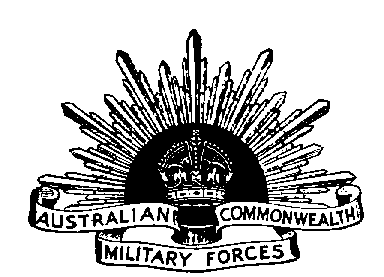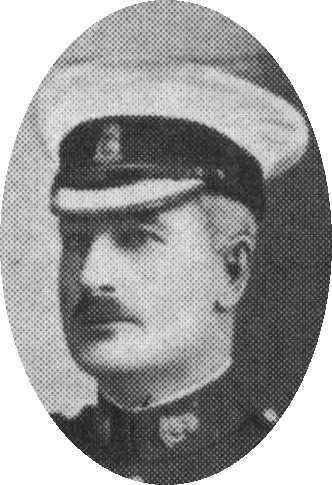


George Jameson Johnston was born in Melbourne on 24 October
1868. He was educated at the Model School and joined the family firm of Charles
Johnson & Co, furniture manufactures and warehousemen. He was also a member
of the Fitzroy City Council from 1896 to 1899.
In 1887, Johnston enlisted in the militia as a gunner in the Victorian Field Artillery. He was commissioned as a lieutenant in 1889 and promoted to captain in 1895. In 1899, he volunteered for service in South Africa, where in November 1899 he was attached to the British 62nd Battery, Royal Field Artillery as a Special service Officer with the rank of captain. He was promoted to major in March 1900. As commander of a section of two guns, he saw service at Klip Drift, Paardeburg, Osfontein and Bloemfontein. He was then attached to a British howitzer brigade. In July 1900 he was invalided home with fever. In March 1902 he became a temporary lieutenant colonel commanding the 4th battalion, Australian Commonwealth Horse but the war ended before he reached South Africa again and the unit returned without seeing active service. Johnston was promoted to lieutenant colonel on 24 April 1909 and took command of the Victorian Field Artillery Brigade.
Johnston was appointed to the AIF on 18 August 1914 as a lieutenant colonel commanding the 2nd Field Artillery Brigade. The brigade sailed for Egypt in October 1914. Guns of the 2nd Field Brigade's 4th Field Battery landed on 25 April 1915 and were the first to open fire on the enemy. The rest of the brigade, less the 6th Field Battery, which was diverted to Helles, came ashore the next day, eventually settling on McCay's Hill and MacLagan's Ridge. From "Johnson's Jolly" the guns were used to -- in the vernacular of the day -- jolly up the Turks. Johnston was designated as commander of the 2nd Division Artillery but became acting commander of the 1st Division Artillery while Brigadier General J. J. T. Hobbs was acting 1st Division commander from August to October 1915. He then commanded the 3rd Infantry Brigade until late November. In December he was promoted to colonel and temporary brigadier general.
Johnston was appointed commander of the 2nd Division Artillery in January 1916. He sailed for France in arch and his artillery fired its first barrage in France on 27 April 1916. He commanded the 2nd Division Artillery at Pozieres, Lagnicourt, Bullecourt, and Third Ypres.
In October 1917, Johnston became upset when he was superseded by Brigadier General W. A. Coxen for the post of Corps Artillery commander on 18 October 1917 and asked to be sent home. General W. R. Birdwood acquiesced to the request, believing that the corps had younger officers who could fill the Johnston's post. He was replaced by Brigadier General O. F. Phillips on 1 November 1917 and returned to Australia. For his services on the Western Front, Johnston was appointed a Companion of the Bath (CB) and Companion of St Michael and St George (CMG) and he had been mentioned in dispatches four times.
On 21 April 1918, Johnston became Military Administrator of New Guinea. Johnston brought outlying districts of the territory under more effective control and established some new districts and posts for better control of the territory. Johnston's temperament was not an ideal on for the post of administrator and he attracted public criticism. On 1 May 1920, he was replaced by Brigadier General T. Griffiths.
After the war Johnston resumed his pre-war position as director of Johnston's Pty Ltd. He commanded the 3rd Division from 1922 to 1927 and was promoted to major general on 1 October 1923.
He died on 23 May 1949 and was buried at Brighton Cemetery after a military funeral.
Sources: Australian Dictionary of Biography, 1899-1939, Vol 9, pp. 500-501; AWM 183/27; Bean, C. E. W., The Official History of Australia in the War of 1914-1918. Volume II: The Story Of Anzac, p. 59-60; MacKenzie, S. S.. Volume X: The Australians at Rabaul, pp. 342-344
Page created by Ross
Mallett
ross@metva.com.au
Last update 25 August 2001